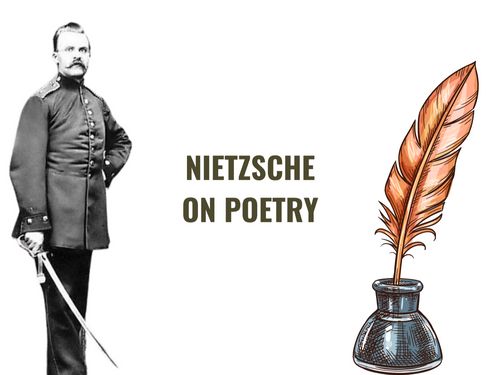Nietzsche on the origin of poetry
Oct 15, 2021 · 2 mins read
0
Share

Poetry makes communication more complex - it "mocks expediency and utility." And yet it developed all over the world. Doesn't the "wild irrationality of poetry" refute utilitarianism? No, Nietzsche says - poetry actually has deep utility 👇
Save
Share
Nietzsche is no fan of utilitarians. He says "they are right so rarely that it is really pitiful." But this time, he says, "I have to side with the utilitarians."
Save
Share
Poetry's origin was superstitious. People noticed "men remember a verse much better than ordinary speech." They hoped Gods would find their requests more memorable too, if expressed as poems.
Save
Share
Gods were far away, and "a rhythmic tick-tock was audible over greater distances." Thus rhythmic poetry was an attempt to "get closer to the ears of the Gods."
Save
Share
Rhythm is compulsive - "not only our feet follow the beat but the soul does, too." Perhaps the soul of the Gods responded to rhythm too? Nietzsche writes: "Thus one tried to compel the Gods by using rhythm and to force their hand: poetry was thrown at them like a magical snare."
Save
Share
Misfortune was considered a consequence of angry Gods. Rhythmic music and dance calmed people down - perhaps Gods too could be placated this way? The idea was to "push the exuberance and giddiness of the emotions to the ultimate extreme" and come out the other side.
Save
Share
Etymologically, the word melody comes from melos, which also means a tranquilizer. Music, dance and melodic poetry are tranquilizers not because they themselves are tranquil, but because their "aftereffects make one tranquil."
Save
Share
Nietzsche points out that Apollo is a God of both poetry and prophesy. The original meaning of prophesy was to bind the future in a certain direction, and the right poem heard by the right God could do just that.
Save
Share
Nietzsche says rhythm "enabled one to do anything - to advance some work magically; to force a god to appear, to be near, and to listen; to mold the future in accordance with one's will; to cleanse one's own soul." Very little could've been more useful.
Save
Share
Bottom line. Poetry emerged as a useful tool, not just as an amusing past-time. It tranquilized chaos. It cut through time as people remembered it for long. It cut through space as it travelled long distances. And for the superstitious, it was a direct line to God.
Save
Share
0